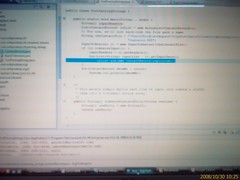The Google App Engine supports Django, which is a great way to build a UI. Getting it set up is a bit tricky if you're using a database, though, since Django has some different expectations about how you will interact with a DB. Fortunately the good people at Google have provided a Django project to help with this. Their instructions are on this page.
This post doesn't tell you anything that you can't find elsewhere - I just pulled it from one of my OneNotes pages to share because it is a bit more concise, and it also has a couple of screen caps from Eclipse.
Local Django Configuration in Eclipse
- Go to the directory where you want to create your app, and run "django-admin.py startproject mysite" where "mysite" is the name of your app.
- Navigate to the directory where "manage.py" lives for your app.
- Make sure that app-yaml has an app name in it (pretty much anything will work, I think).
- Fire up the local Django app server with "python manage.py runserver".
- To see your app on the local server, go to: http://localhost:8000/.
- To see the local admin console, go to: http://localhost:8000/_ah/admin/.
To add a new view / URL in Django (for more details, see the example from the Django tutorial):
1) Add a new function to views.py

2) Add a regex and the function to urls.py


That pretty much does it. I found that this worked well & gave me really good debugging capabilities (the local Django gives excellent information when debugging is turned on - which is by default).









 Having a system to capture information is even more useful than I thought it would be. I use something similar to
Having a system to capture information is even more useful than I thought it would be. I use something similar to 
